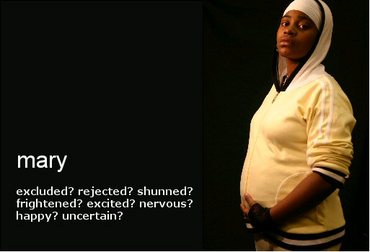Blogging
Interesting article on the BBC's website about blogging.

"We are entering one era in which the technological infrastructure is creating a different context for how we tell our stories and how we communicate with each other"
not as seen on tv
Interesting article on the BBC's website about blogging.

The Sunday service at St Mary's led by Anna using a box full of kisses as the theme - the whole congregation making a long paper chain stamped with kisses and prayers for those who needs God's kiss this Christmas.


Thanks to Jonny Baker for alerting me to this one. This image of Mary was created by Ben Bell to advertise local church services over Christmas - very simple idea, well executed and thought provoking.


I have just come out of the presentation given by Mark Thompson, Director General of the BBC at which he announced potential job losses of 3,000 and a big move to Manchester. These are my notes.

30 years ago as a teenager I visited a mental hospital with a group from our local Methodist church. In a secure wing we met a lady called Lillian who was there for the protection of herself and everyone around her. She was an amazing pianist and everyone in this locked ward loved her. I still have a recording made on the ward. A few years ago the hospital was finally closed and many people like Lillian were moved on.
The opinions expressed on this site are those of Mark Waddington and not his employer. If I have made any errors or published anything unfairly please bring it to my attention and I will make corrections if appropriate.